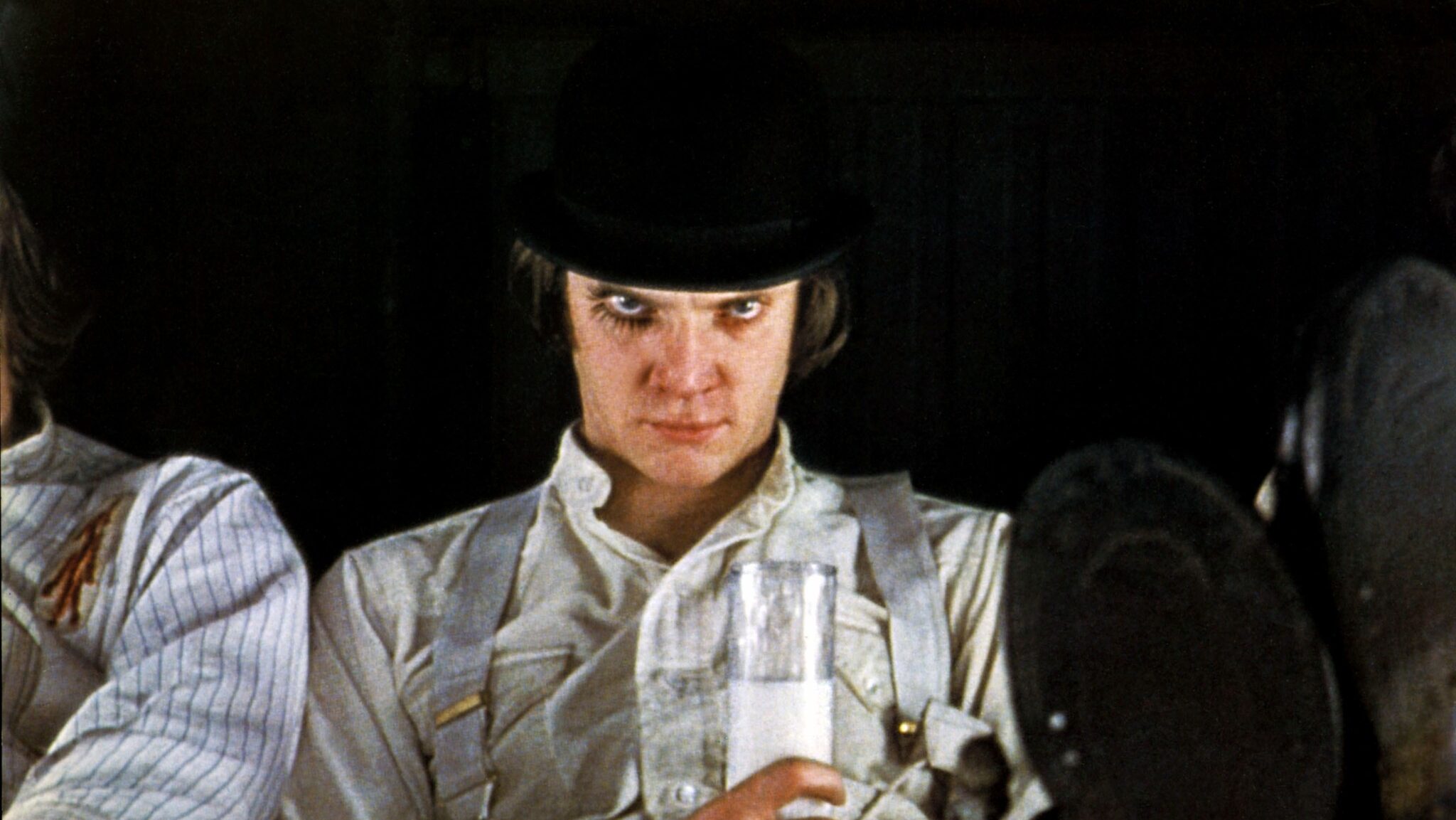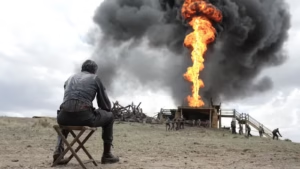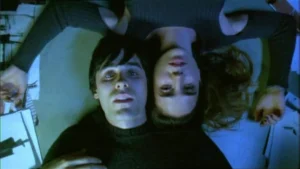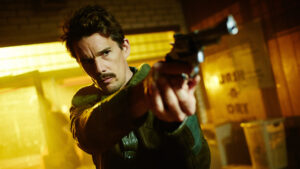Table of Contents
Introduction: The Dark Vortex of Free Will
In the realm of dystopian cinema, A Clockwork Orange remains a haunting exploration of the intricate dance between free will and societal control. Stanley Kubrick’s unsettling adaptation of Anthony Burgess’s novel invites viewers into a chaotic world where the protagonist, Alex, embodies both the allure and horror of absolute freedom. This A Clockwork Orange analysis delves deep into the psychological and philosophical underpinnings that frame Alex’s journey, ultimately challenging our understanding of morality, choice, and the repercussions of free will.
As we traverse the dark corridors of this film, we will grapple with the existential dilemmas posed by conditioning, the nature of evil, and the societal structures that seek to impose conformity. Join me as we unravel the layers of meaning that make A Clockwork Orange a significant commentary on the human condition.
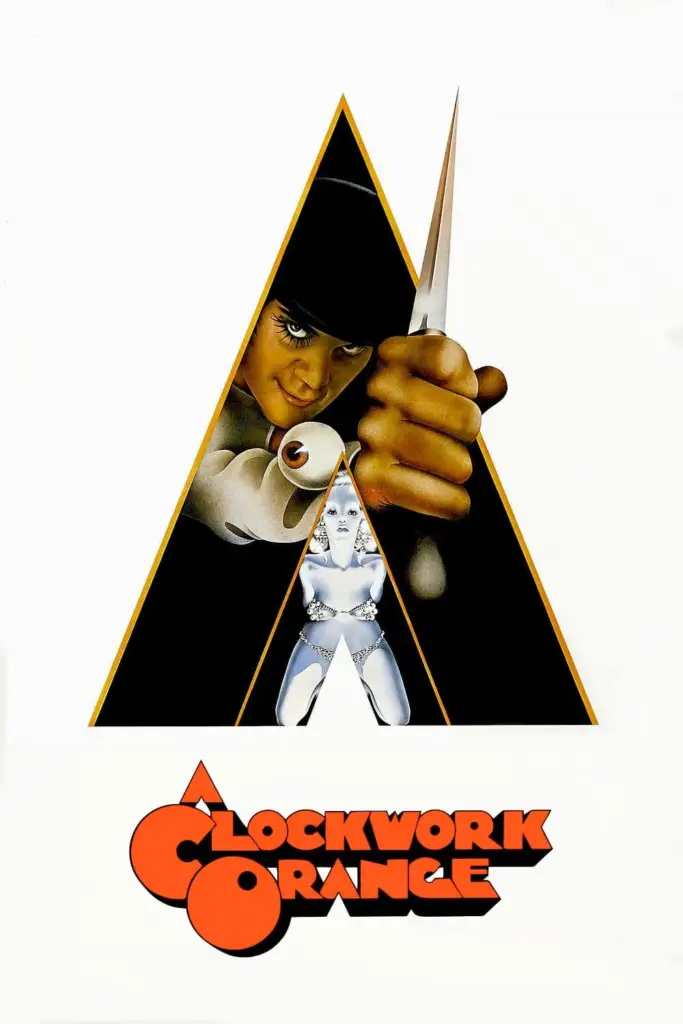
The Dilemma of Free Will vs. Control: A Psychological Perspective
The Nature of Free Will
In A Clockwork Orange, the notion of free will is presented as a double-edged sword. On one hand, it embodies the capacity for individuals to choose their paths, make decisions based on personal desires, and indulge in the inherent chaos of human existence. Yet, this freedom can also lead to devastating consequences. Alex, the protagonist, exemplifies this intricate relationship between choice and chaos. His violent escapades raise critical questions about the fundamental nature of free will. Are individuals inherently good, or does the freedom to choose lead them down a path of destruction?
From a psychological standpoint, free will is often explored through the lens of determinism. Psychoanalysts like Freud argue that unconscious motives heavily influence human behavior, suggesting that while we believe we are making free choices, our decisions may be predetermined by unresolved conflicts within the psyche. This theme resonates throughout the film, where Alex’s violent impulses appear both as a product of personal choice and as a reflection of societal influences.

The Mechanisms of Control
On the opposing end of the spectrum lies the concept of control, exemplified through the Ludovico Technique. This form of behavioral conditioning strips Alex of his agency under the guise of reforming him into a socially acceptable being. The imposition of control highlights a philosophical question: can true morality exist without free will? By eradicating Alex’s capacity for choice, society imposes a rigid definition of what is ‘good,’ yet this form of control ultimately dehumanizes him.
Psychologically, the movie illustrates the dangers of external control mechanisms that seek to suppress individual desires for the sake of order. It challenges the audience to reflect on the ethical implications of such interventions. Is it justifiable to prioritize societal stability over personal autonomy? This question echoes in contemporary debates surrounding issues like surveillance, rehabilitation, and the legal system. By representing control as a tool for conformity, the film critiques the often unexamined moral values underpinning attempts to regulate behavior.
The Psychological Trap of Conformity
A Clockwork Orange underscores the psychological trap inherent in conformity. The intense societal pressure to adhere to normative standards can lead individuals to deny their innate desires and responsibilities. Alex’s transformation into a “good citizen” through aversive conditioning raises disturbing implications about identity. When one is stripped of the ability to act according to personal beliefs, does one lose their authenticity?
The psychological phenomenon known as cognitive dissonance illustrates how individuals rationalize their behaviors to align with societal expectations. Alex’s journey reflects this dissonance as he grapples with the stark contrast between his previous violent freedom and the imposed control over his actions. Audiences are left pondering the true cost of sacrificing individuality for the illusion of safety and harmony within society. The film compels viewers to question where their own boundaries lie and whether the trade-offs between free will and control are worth the price of conformity.
The Philosophy of Evil: Understanding Alex and Moral Choices
The Nature of Free Will
At the heart of A Clockwork Orange analysis lies the character of Alex DeLarge, who embodies the struggle between free will and moral choice. Alex’s actions raise fundamental questions about the nature of evil. Is he inherently evil, or is he a product of his environment? The film challenges viewers to consider whether free will is a blessing or a curse.
Alex’s violent behavior can be interpreted as an exercise of his freedom, yet it leads to dire consequences for himself and others. This paradox of choice illustrates a profound philosophical dilemma: if individuals have the freedom to choose, does that also imply the responsibility for their actions? By showcasing Alex’s descent into chaos, the film prompts discussions on moral agency and the essence of human nature.

The Influence of Society
Another vital aspect of the A Clockwork Orange analysis is the role society plays in shaping an individual’s moral compass. The dystopian setting serves as a reflection of a corrupted society that normalizes violence and depravity. Alex, although a perpetrator of heinous acts, can also be seen as a product of his environment, overloaded with societal influences that promote aggressive behavior.
The film invites the audience to ponder the impact of societal constructs on individual morality. Does society bear some blame for the creation of a character like Alex? His violent tendencies are not just personal failings; they are also symptomatic of a larger systemic issue that fosters conformity over individuality. The grotesque nature of society serves as a backdrop that influences moral decisions, raising the question of whether Alex’s evil acts are merely a rebellion against an oppressive world.
Redemption and the Human Condition
As Alex undergoes transformation through aversion therapy, the film delves deeper into the philosophical discourse on redemption and rehabilitation. The mechanical approach to correcting his behavior strips away his personal agency, compelling viewers to question the ethics of such methods. Does forcing someone to adhere to societal norms truly equate to moral improvement?
The treatment Alex receives raises concerns about the loss of individuality and the essence of being human. While the intent is to eradicate evil behavior, it ultimately renders Alex incapable of genuine moral choices. Through this lens, the film critiques a society that prioritizes conformity over compassion, challenging viewers to reflect on the complexities of morality and the dark side of human psychology.
The Implications of Conditioning: Psychological Manipulation and Society
The Nature of Conditioning
In A Clockwork Orange, the protagonist Alex undergoes a harrowing transformation through a process known as aversion therapy. This method of conditioning raises significant questions about the ethical implications of psychological manipulation on the individual. By stripping away one’s ability to choose between right and wrong, society risks erasing the fundamental essence of what it means to be human. The film illustrates a society that prioritizes order and conformity over individual freedom, prompting viewers to reflect on the cost of such compliance.

The Power Dynamics of Control
The state’s influence permeates through the narrative, showcasing how authority can weaponize psychological techniques to maintain control. The Ludovico Technique, which subjects Alex to graphic imagery paired with electric shock to instill aversion, serves as a chilling representation of how power can exploit the mind. This manipulation reflects broader societal fears regarding government overreach and the sacrifices made in the name of public safety. It provokes a deep sense of unease about who decides the parameters of moral behavior and the potential consequences of surrendering personal autonomy.
The Consequences of Loss of Free Will
A troubling aspect of the film is the moral vacuum created by the removal of free will. Alex’s transformation reveals that without the capacity to choose, the very concept of morality becomes meaningless. The A Clockwork Orange analysis highlights the danger of a society that equates conformity with safety. Instead of fostering a diverse range of thoughts and behaviors, such conditioning creates a homogenous population, devoid of genuine human experiences.
The film forces us to confront the idea that the absence of choice leads to a superficial existence. Alex’s struggle illustrates the inherent conflict between instinctual desire and imposed moral codes. This tension invites discussions around the very nature of humanity: are we defined by our choices, or are we mere products of our conditioning?
In revisiting these themes, we are encouraged to consider the psychological ramifications of a society willing to sacrifice autonomy for the sake of security, leaving us with profound questions about the future of individual freedom in a conformist world.
Visual Storytelling: Techniques that Amplify Dystopian Themes
Distorted Perspectives
In A Clockwork Orange, the use of distinctive camera angles and distorted perspectives plays a pivotal role in shaping the viewer’s understanding of Alex’s tumultuous world. The film employs a subjective viewpoint that often places the audience directly in Alex’s shoes, compelling us to experience his violent yet alluring escapades firsthand. This stylistic choice creates a sense of disorientation, reflecting the moral ambiguity and chaos present in the society he navigates.
By using techniques like close-ups, the film emphasizes emotion and intensity, allowing viewers to feel the psychological depth of each moment. The unsettling juxtaposition of beauty and horror serves to amplify the dystopian themes, further blurring the lines between freedom and control. This interplay of perspective not only highlights Alex’s inner turmoil but also mirrors society’s descent into moral decay.
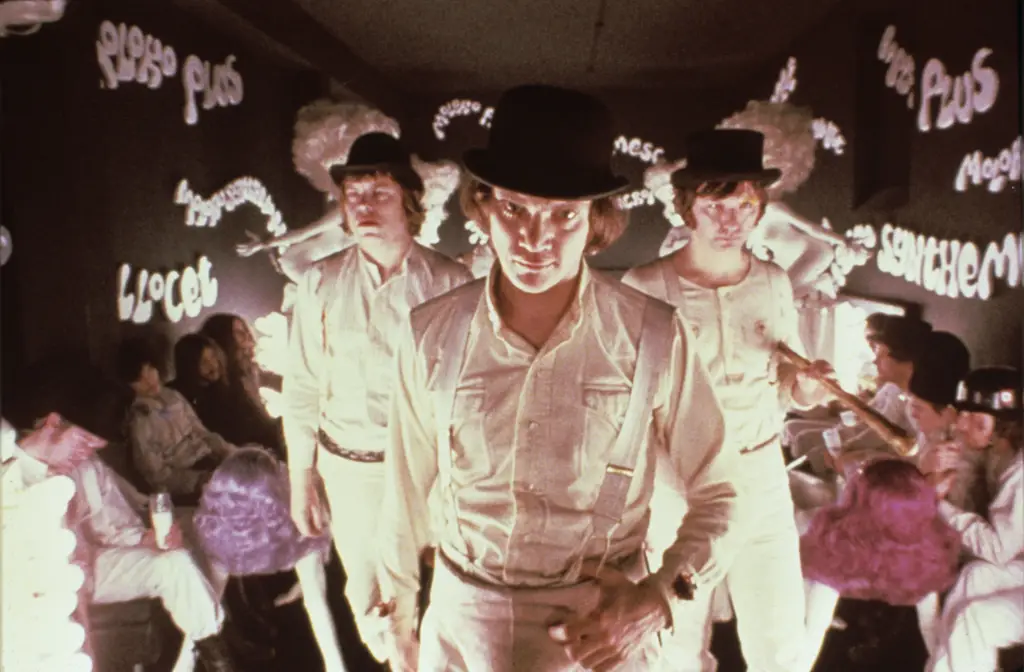
Color Palette and Symbolism
The bold and striking color palette of A Clockwork Orange serves as a critical tool for visual storytelling. The contrasting colors, particularly the use of bright oranges and deep blacks, symbolize the clash between human creativity and oppressive conformity. Orange represents Alex’s vibrant individuality, while the darkness signifies the looming presence of societal constraints.
These vibrant colors juxtaposed against bleak urban landscapes reinforce the film’s themes of rebellion and the loss of free will. As the narrative unfolds, the viewer becomes acutely aware of how color impacts emotional resonance and character development. This deliberate choice compels the audience to question the nature of Alex’s freedom and the society that seeks to restrain it, thus enriching the A Clockwork Orange analysis through visual means.
Movement and Editing
The kinetic energy in A Clockwork Orange is magnified through dynamic movement and innovative editing techniques. Rapid cuts and seamless transitions engage the viewer, mirroring the frenetic pace of Alex’s life. These techniques contribute to a rhythm that feels almost hypnotic, immersing the audience in his anarchic world.
Slow-motion sequences further highlight key moments, allowing the viewer to reflect on the gravity of Alex’s actions amidst their chaotic context. This manipulation of time enhances the emotional impact and serves to emphasize the moral dilemmas faced by both Alex and society. The editing style, combined with the score’s jarring orchestral music, amplifies the overall sense of turmoil and entrapment, reinforcing the pervasive anxiety surrounding free will and conformity within the narrative.

Book Recommendations: Literature that Explores Similar Themes
One of the most captivating aspects of A Clockwork Orange is its exploration of free will, morality, and the nature of evil. To deepen your understanding of these themes, here are several thought-provoking books that delve into similar philosophical and psychological territories.
Brave New World by Aldous Huxley
This dystopian novel envisions a future society driven by technological advancements and a loss of individuality. Huxley raises questions about the cost of happiness and the dangers of a conformist society that sacrifices free will for stability.
Buy Brave New World here
1984 by George Orwell
Orwell’s classic extends the theme of conformity to the extreme, detailing a totalitarian regime that enforces thought control and obliterates personal freedom. The psychological manipulation faced by the protagonist, Winston Smith, offers a disturbing reflection on the lengths to which authorities will go to suppress individuality.
Buy 1984 here
The Stranger by Albert Camus
In this existential novel, Meursault navigates a world devoid of meaning, embodying absurdity and exploring the implications of living authentically in a society that demands conformity. Camus’ work challenges readers to consider the nature of personal choice against societal pressures.
Buy The Stranger here
Fahrenheit 451 by Ray Bradbury
Bradbury presents a future where literature is banned and critical thinking is frowned upon, leading to a culture of unquestioning conformity. As the protagonist, Montag, embarks on a journey of self-discovery, readers are encouraged to reflect on the importance of free thought and the role of censorship in society.
Buy Fahrenheit 451 here
The Giver by Lois Lowry
This thought-provoking novel explores a seemingly utopian society that has sacrificed emotional depth and individuality for the sake of order and predictability. The journey of the protagonist, Jonas, highlights the ethics of choice and the value of human experience, making it a poignant companion to A Clockwork Orange.
Buy The Giver here
Conclusion: The Enduring Impact of A Clockwork Orange
In summation, our A Clockwork Orange analysis has traversed the intricate dance between free will and conformity, delving into the psychological and philosophical underpinnings that define its narrative. The film forces us to confront uncomfortable truths about human nature, questioning the limits of moral choice within a society that often prioritizes control over individuality.
As we reflect on Alex’s harrowing journey, it becomes clear that the themes explored in this cinematic masterpiece resonate far beyond its dystopian setting. The dialogue it opens about the essence of evil, the ethics of conditioning, and the price of free will remains relevant in today’s sociopolitical landscape.
Ultimately, A Clockwork Orange is not just a film; it is a challenging exploration of what it means to be human, leaving an indelible mark on both film and philosophy that invites endless discussion and introspection.
Take a look at all our in-depth reviews here.

